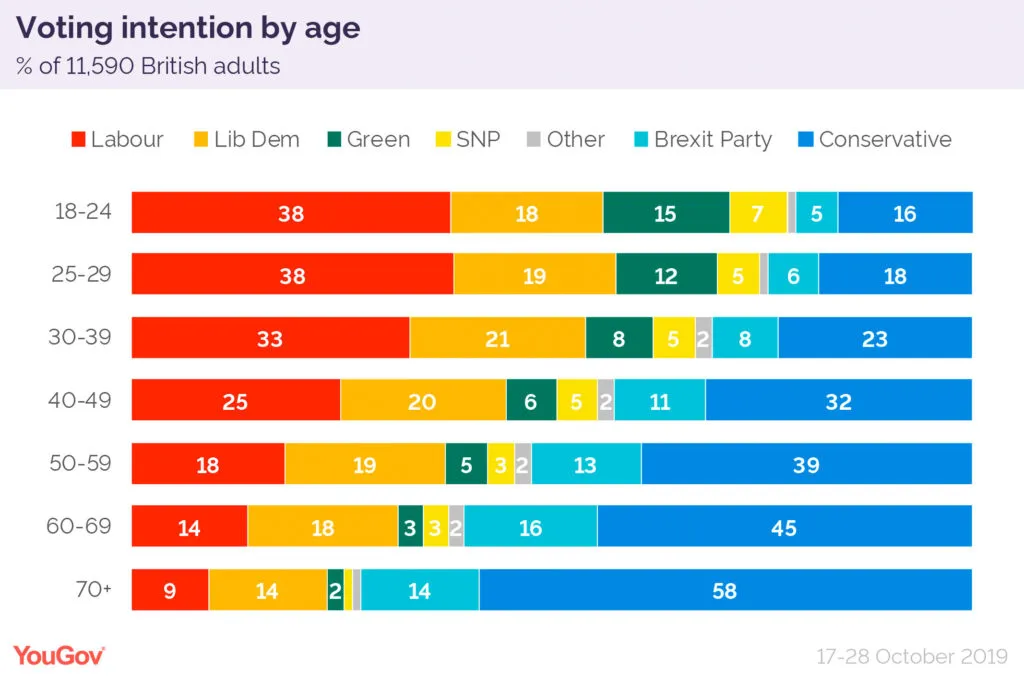Why coming out as a Conservative is in no way, shape or form ‘almost worse than coming out as gay’

Young Tories at the Conservative Party Conference 2019. (Getty)
A viral tweet claimed that “coming out as Conservative is almost worse than coming out as gay in modern western society”. Here’s why that’s not true.
With the 12 December general election fast approaching, there has been an uptick in discourse around young Tories being the victims of oppression.
The general argument goes something like this: millennial Conservative voters are discriminated against in house shares, on dating apps and on social media by their liberal counterparts, who outnumber them vastly.
The Telegraph‘s Charlotte Gill summed up the issue rather pithily, asking: “How could I date a boy who treated my right-wing persuasion as if it was chlamydia?”
How could you indeed, Charlotte. Certainly, today’s politics are deeply fractured and more tribal than they’ve been in the past two decades. Gone are the days of centrism, when the biggest difference between Tony Blair and David Cameron was the colour of their tie – instead, we now have two major parties who have turned towards socialism and nationalism respectively.
It’s also true to say that generation Tinder is dominated by lefties. A poll released just before the dissolution of parliament showed a clear correlation between a person’s age and their politics. According to YouGov stats, Conservative voters make up just 16 per cent of 18-24-year-olds and 18 per cent of 25-29-year-olds. Left-wing voters, meanwhile, made up about three-quarters of both age ranges.

YouGov chart showing that younger people are more likely to vote for Labour or one of the liberal parties. (YouGov)
All of this is to say that yes, “coming out” as a Tory to people born in the post-Thatcher era is likely to provoke a deeply negative response.
But to even put it in the same sentence as the trauma that can accompany coming out as LGBT+ is to completely misunderstand what that experience is.
A political opinion is something that you choose. It is a choice that can be subconsciously informed by a person’s upbringing, faith, socioeconomic background or indeed, sexual orientation or gender identity – but it is a choice all the same.
To be LGBT+ is anything but. Queer people are routinely ostracised by society and denied basic human rights, and while many of us wouldn’t change a thing about who we are, to suggest that all of this is akin to a person’s party allegiance – something that can be picked up, dropped and changed at whim – is an insult.
In the UK, trans people are made to wait for up to three years to see a doctor and are forced to seek the permission of doctors before they can be legally declared as the correct gender. There is no legal path to recognition for non-binary people, who are forced to carry passports that don’t reflect their gender. Queer men are denied full and free access to PrEP, medication which can prevent the transmission of HIV. So-called gay conversion therapy is still legal. Queer people – and in particular, trans women – are disproportionately the victims of violence and, too often, murder. The list on injustices goes on, and on, and on, and many of them continue to affect LGBT+ people precisely because of government inaction.
In comparison, Conservatives are sometimes called nasty names. That’s it. Meanwhile, for the past decade, the highest and most powerful office in the land has been occupied by – you guessed it – a Conservative. Even in times when Labour has governed, the Conservatives have made up, at a minimum, one-quarter of the seats in parliament, giving them clear representation.
LGB people meanwhile, were elected to just under 7 per cent of seats in the last election. Because we’ve never been counted in official censuses, it’s impossible to say whether that is a fair representation – though we can confidently say that trans people don’t have an adequate voice in Westminster, being that the UK has never elected a trans MP.
The tweet in question also referred to the “social pressure” of voting for Labour. This writer refutes that there can be social pressure for an act that is – by law – conducted in complete and utter privacy. In contrast, while there is such a thing as “passing” for LGBT+ people, for many there is no such thing as privacy. To be visibly queer is to be the target of bullies, aggressors and murderers. At the risk of labouring the point – being a Tory voter carries none of these risks.
So for the record, coming out as Conservative is not in any way comparable to coming out as LGBT+. In fact, using the language of oppression to talk about a group that suffers no real prejudice (quite the opposite, rather) is a clear example of cis-het privilege, and deserves to be dragged just as much as it is right now.
People aren’t sent to conversion camp for conservativism Dominique https://t.co/5qzznmjXRf
— Lucas Hamilton (@itskenblatchi) December 2, 2019
Families kick out their children because they’re LGBT. They didn’t choose to be like that. You choose to be a Tory so stop being so heartless. They are not the same https://t.co/dn83wO9oFQ
— libdem (@Iibdem) December 2, 2019
Imagine having to sit your parents down and tell them that you’re attracted to right wing politics. Must be so hard for you dominique, sending thoughts and prayers https://t.co/xYPsrLHFfh
— Calum McSwiggan (@CalumMcSwiggan) December 2, 2019
it sucks the amount of countries you can be arrested in for being a tory doesn’t it yeah it’s the same https://t.co/HBuVZiYKei
— saz (@sarahlostctrl) December 2, 2019
I’m missing teeth because some kid assumed I was gay before I transitioned. You’re right. This is exactly the same. ? https://t.co/IWit9IhZ9J
— Christina Grimwade (@Chr1stinaG) December 2, 2019
If someone is ashamed of their political beliefs, that’s on them. They’re a choice.
If someone is ashamed of their sexuality, an intrinsic human quality, that’s on society.Political positions are fair game. Sexuality never is.
— Ryan (@rynmorgn) December 2, 2019
Nope, this isn’t it. I was outed publicly when I was 15, in the middle of the school playground at lunchtime. 200 kids stopped, stared, pointed, laughed and pelted me with food. I was an outcast, a joke, a pervert, a monster. You have no idea.
— Libby ?️???? (@LibbyLights) December 2, 2019

